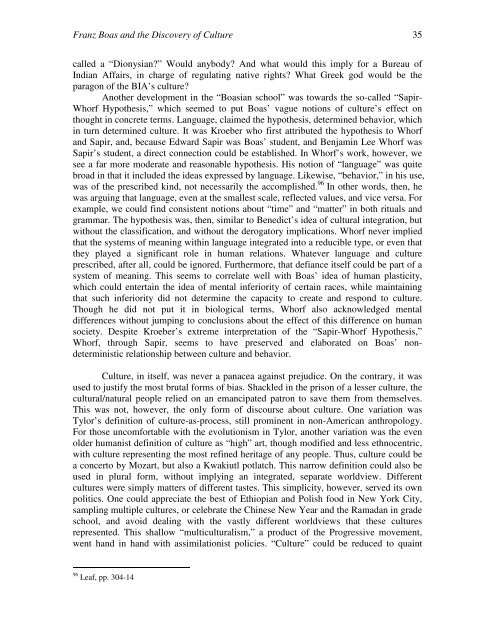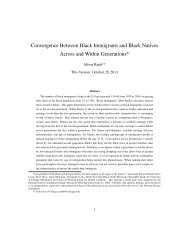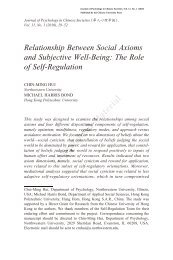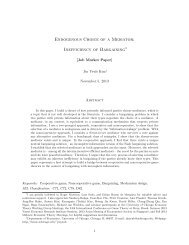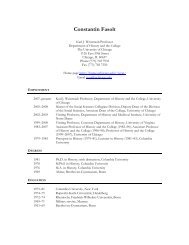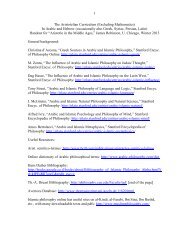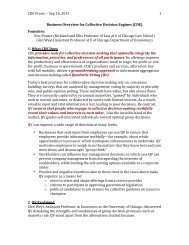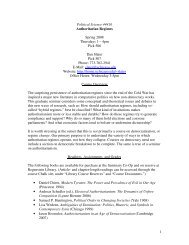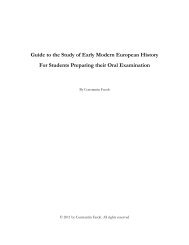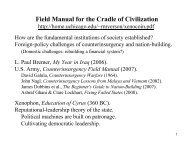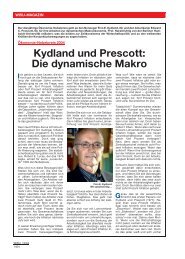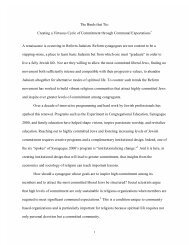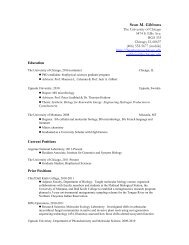Franz Boas and the Discovery of Culture - Personal Web Pages ...
Franz Boas and the Discovery of Culture - Personal Web Pages ...
Franz Boas and the Discovery of Culture - Personal Web Pages ...
Create successful ePaper yourself
Turn your PDF publications into a flip-book with our unique Google optimized e-Paper software.
<strong>Franz</strong> <strong>Boas</strong> <strong>and</strong> <strong>the</strong> <strong>Discovery</strong> <strong>of</strong> <strong>Culture</strong> 35<br />
called a “Dionysian?” Would anybody? And what would this imply for a Bureau <strong>of</strong><br />
Indian Affairs, in charge <strong>of</strong> regulating native rights? What Greek god would be <strong>the</strong><br />
paragon <strong>of</strong> <strong>the</strong> BIA’s culture?<br />
Ano<strong>the</strong>r development in <strong>the</strong> “<strong>Boas</strong>ian school” was towards <strong>the</strong> so-called “Sapir-<br />
Whorf Hypo<strong>the</strong>sis,” which seemed to put <strong>Boas</strong>’ vague notions <strong>of</strong> culture’s effect on<br />
thought in concrete terms. Language, claimed <strong>the</strong> hypo<strong>the</strong>sis, determined behavior, which<br />
in turn determined culture. It was Kroeber who first attributed <strong>the</strong> hypo<strong>the</strong>sis to Whorf<br />
<strong>and</strong> Sapir, <strong>and</strong>, because Edward Sapir was <strong>Boas</strong>’ student, <strong>and</strong> Benjamin Lee Whorf was<br />
Sapir’s student, a direct connection could be established. In Whorf’s work, however, we<br />
see a far more moderate <strong>and</strong> reasonable hypo<strong>the</strong>sis. His notion <strong>of</strong> “language” was quite<br />
broad in that it included <strong>the</strong> ideas expressed by language. Likewise, “behavior,” in his use,<br />
was <strong>of</strong> <strong>the</strong> prescribed kind, not necessarily <strong>the</strong> accomplished. 96 In o<strong>the</strong>r words, <strong>the</strong>n, he<br />
was arguing that language, even at <strong>the</strong> smallest scale, reflected values, <strong>and</strong> vice versa. For<br />
example, we could find consistent notions about “time” <strong>and</strong> “matter” in both rituals <strong>and</strong><br />
grammar. The hypo<strong>the</strong>sis was, <strong>the</strong>n, similar to Benedict’s idea <strong>of</strong> cultural integration, but<br />
without <strong>the</strong> classification, <strong>and</strong> without <strong>the</strong> derogatory implications. Whorf never implied<br />
that <strong>the</strong> systems <strong>of</strong> meaning within language integrated into a reducible type, or even that<br />
<strong>the</strong>y played a significant role in human relations. Whatever language <strong>and</strong> culture<br />
prescribed, after all, could be ignored. Fur<strong>the</strong>rmore, that defiance itself could be part <strong>of</strong> a<br />
system <strong>of</strong> meaning. This seems to correlate well with <strong>Boas</strong>’ idea <strong>of</strong> human plasticity,<br />
which could entertain <strong>the</strong> idea <strong>of</strong> mental inferiority <strong>of</strong> certain races, while maintaining<br />
that such inferiority did not determine <strong>the</strong> capacity to create <strong>and</strong> respond to culture.<br />
Though he did not put it in biological terms, Whorf also acknowledged mental<br />
differences without jumping to conclusions about <strong>the</strong> effect <strong>of</strong> this difference on human<br />
society. Despite Kroeber’s extreme interpretation <strong>of</strong> <strong>the</strong> “Sapir-Whorf Hypo<strong>the</strong>sis,”<br />
Whorf, through Sapir, seems to have preserved <strong>and</strong> elaborated on <strong>Boas</strong>’ nondeterministic<br />
relationship between culture <strong>and</strong> behavior.<br />
<strong>Culture</strong>, in itself, was never a panacea against prejudice. On <strong>the</strong> contrary, it was<br />
used to justify <strong>the</strong> most brutal forms <strong>of</strong> bias. Shackled in <strong>the</strong> prison <strong>of</strong> a lesser culture, <strong>the</strong><br />
cultural/natural people relied on an emancipated patron to save <strong>the</strong>m from <strong>the</strong>mselves.<br />
This was not, however, <strong>the</strong> only form <strong>of</strong> discourse about culture. One variation was<br />
Tylor’s definition <strong>of</strong> culture-as-process, still prominent in non-American anthropology.<br />
For those uncomfortable with <strong>the</strong> evolutionism in Tylor, ano<strong>the</strong>r variation was <strong>the</strong> even<br />
older humanist definition <strong>of</strong> culture as “high” art, though modified <strong>and</strong> less ethnocentric,<br />
with culture representing <strong>the</strong> most refined heritage <strong>of</strong> any people. Thus, culture could be<br />
a concerto by Mozart, but also a Kwakiutl potlatch. This narrow definition could also be<br />
used in plural form, without implying an integrated, separate worldview. Different<br />
cultures were simply matters <strong>of</strong> different tastes. This simplicity, however, served its own<br />
politics. One could appreciate <strong>the</strong> best <strong>of</strong> Ethiopian <strong>and</strong> Polish food in New York City,<br />
sampling multiple cultures, or celebrate <strong>the</strong> Chinese New Year <strong>and</strong> <strong>the</strong> Ramadan in grade<br />
school, <strong>and</strong> avoid dealing with <strong>the</strong> vastly different worldviews that <strong>the</strong>se cultures<br />
represented. This shallow “multiculturalism,” a product <strong>of</strong> <strong>the</strong> Progressive movement,<br />
went h<strong>and</strong> in h<strong>and</strong> with assimilationist policies. “<strong>Culture</strong>” could be reduced to quaint<br />
96 Leaf, pp. 304-14


